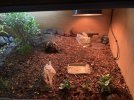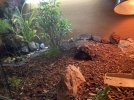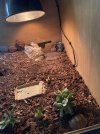BeauBen
New Member
I have two 8 month old leopard tortoises and they’re perfectly healthy and eating really well I just wanted a second opinion on whether to turn off the heat bulb at night or to get a ceramic heater as currently I have it on 24/7 with an ambient temp of 26-28 degrees, basking spot of 32-35 and a cool side of 25 but my worry was that I’m interrupting their Circannual Rhythms by having the heat lamp light on 24/7. I mean I have a cork bark hide for them to go in but they barely use it and just sleep by the succulents or even near the heat lamp and they sleep like logs and don’t seem to mind but since they’re so young I’m worried this will have an affect on them. I could even get a hide to close off at night and try get them to use it at night but I’m not sure so any suggestions will be greatly appreciated  * the UV light in the photo is only on so you can see where they are
* the UV light in the photo is only on so you can see where they are


